
views
X
Trustworthy Source
PubMed Central
Journal archive from the U.S. National Institutes of Health
Go to source
However, certain foods, oral hygiene habits, and medical conditions can wear away your enamel faster than it can repair itself. Fortunately, it's possible to restore your enamel with a few simple changes. Research suggests that you may be able to repair your enamel by using fluoride treatments, caring for your teeth, and avoiding harmful foods.[2]
X
Research source
Repairing Enamel

Learn the causes of tooth enamel erosion. There are many different causes of tooth enamel erosion including poor diet choices and some medical conditions. Learning the causes can help you prevent further decay. Acidic drinks, including citrus juices and sodas can contribute to enamel erosion. Diets high in starches and sugars can also lead to enamel erosion. Medical conditions like acid reflux disease (GERD), dry mouth, inherited genetic conditions, low salivary flow and gastrointestinal problems may cause your teeth to erode. Medications, including aspirin and antihistamines, can contribute to enamel erosion. Mechanical factors such as wear and tear, grinding, friction, brushing too hard, brushing when tooth enamel is softened. Poor oral hygiene can cause enamel erosion.
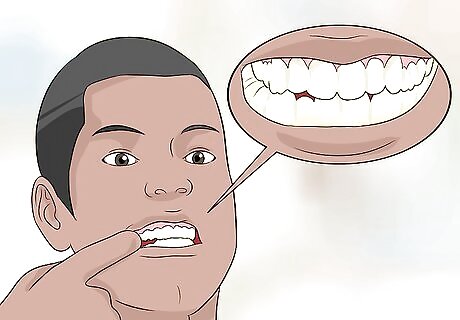
Identify the signs of tooth enamel erosion. Your teeth are yellowing. This is a result of the dentin showing through from behind worn tooth enamel. Excessive sensitivity to temperature and sweet foods and drinks. Chips and cracks in your teeth. Pits or indentations on the surface of your teeth. Visible staining on the surface of your teeth.
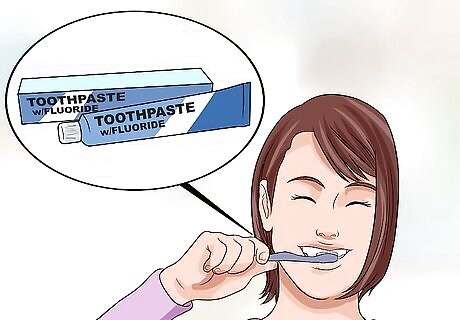
Brush with a fluoride toothpaste. Fluoride can make teeth more resistant to acid, and may even help reverse early decay. Brushing your teeth twice a day with a fluoride toothpaste may help restore enamel or prevent further loss of it. You can get fluoride toothpaste at most pharmacies or grocery stores. Ask your dentist about using fluoride. Too much fluoride can sometimes lead to more problems, such as enamel fluorosis, especially for children. Your dentist can also prescribe stronger fluoride toothpastes than what you would get over the counter.
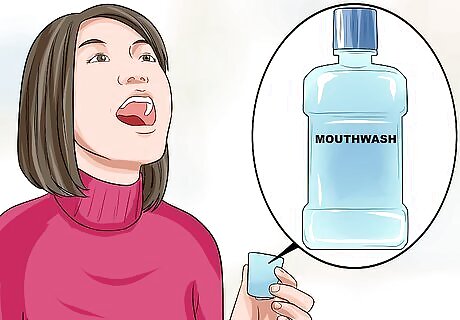
Gargle with a fluoride mouthwash. If you find fluoride toothpaste too harsh, consider gargling with a fluoride mouthwash. This can help restore enamel or prevent further enamel loss. You can get fluoride mouthwashes at most pharmacies and some grocery stores. Your dentist may be able to prescribe a stronger fluoride mouthwash if an over the counter version doesn't work sufficiently.
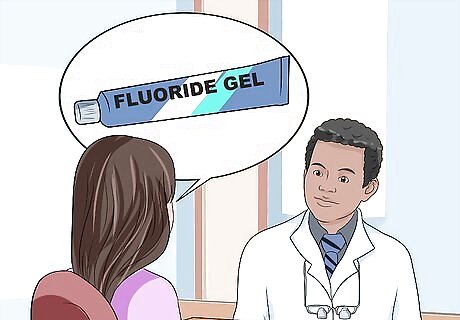
Ask your dentist for a fluoride treatment. The most effective application of fluoride can be done by your dentist, either in the form of a varnish that is painted onto your teeth or a fluoride tray. Your dentist may also prescribe you a fluoride gel you can use at home. It can help to protect your teeth from losing more enamel, prevent cavities, and can promote general oral health. Fluoride treatment can help to strengthen your enamel, furthering the life of your fillings and restorations.
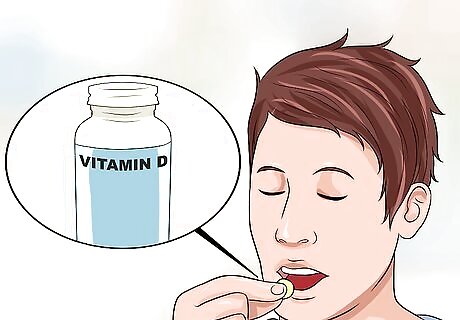
Remineralize your teeth naturally. Add regular remineralizing treatments to your oral hygiene routine. This may help restore enamel and reverse decay. Eating healthy fats, including cultured butter and coconut oil may help remineralize your teeth and promote enamel restoration. Bone broth may be another good option. Taking Vitamin D and calcium supplements may help restore enamel. Adding a ½ cup of coconut oil to your daily diet may help restore enamel.
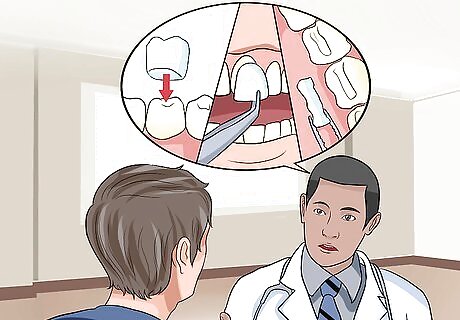
Consult a dentist about restoration options. If home remedies aren't helping to restore your enamel, consult your dentist about other options. Her treatment suggestions will depend on the level of erosion and presence of cavities, and can include dental crowns, fillings, or veneers.
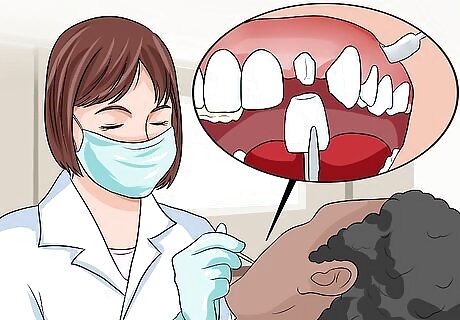
Place crowns over extensive tooth decay and enamel loss. Dental crowns can cap the teeth and restore them to their original shape. The crowns are custom-fitted to cover your original tooth and may help prevent further decay and enamel loss. Your dentist will drill away decayed tooth and enamel and place the crown over the area. Crowns come in gold, porcelain, or resin.
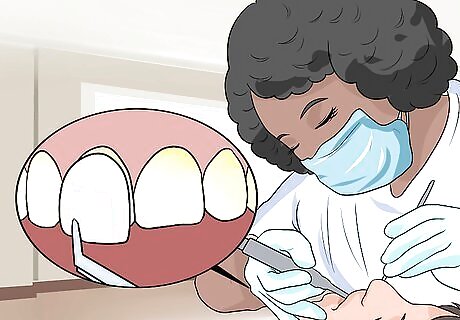
Glue veneers to your teeth. Dental veneers, also called onlays and inlays, are glued to the front of your teeth. Dental veneers cover eroded, cracked, broken or chipped teeth and help prevent further erosion.
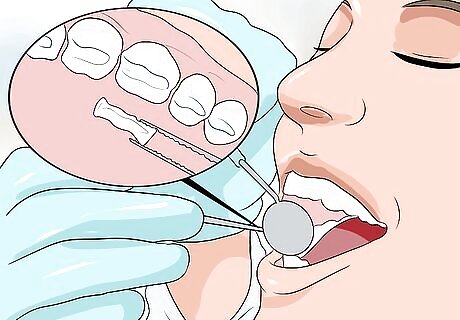
Restore eroded areas with fillings. Dental fillings can repair cavities, which contribute to enamel erosion. This can help prevent further enamel decay and promote the overall well-being of your teeth. Fillings are made of tooth-colored, gold or silver amalgam or composite material designed to smooth out surfaces and decrease tooth sensitivity.
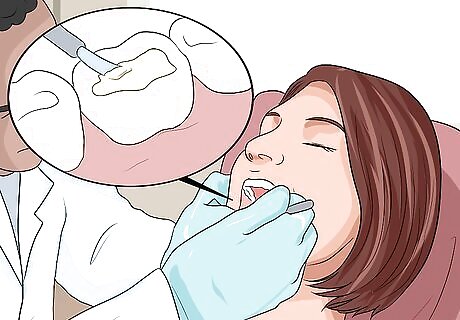
Consider dental sealants. A dental sealant coats the deep groves on molar and premolars and can protect them from decay. Have your dentist or hygienist apply a sealant to your molars for up to 10 years of protection from acid and other types of wear and tear to your teeth.

Complete the restoration procedures. You may have to return to the dentist several times to complete enamel restoration. Follow your dentist's instructions as to treatment, upkeep and suggestions for your dental hygiene.
Maintaining Good Oral Health
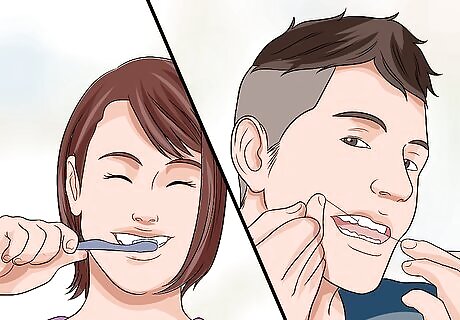
Brush and floss every day, including after meals. Brushing and flossing every day and after meals can maintain the health of your teeth, restorations, and gums. A clean environment may help you avoid further enamel erosion as well as unsightly stains. Make sure to brush and floss after meals if you can. If you have food stuck in your teeth, it promotes an environment that is rife for further damage to your enamel. If you don't have a toothbrush, chewing a piece of gum can help. Avoid brushing your teeth within 30 minutes of eating any acidic food or drink, as acid can weaken enamel and brushing too soon can then damage the enamel.
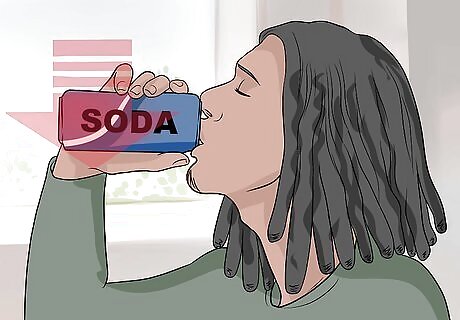
Control your intake of sugary and acidic foods and beverages. Sugary and acidic foods and beverages may contribute to enamel erosion, and controlling your intake of them can lead to better oral health. Brushing your teeth after consuming these foods may help prevent enamel erosion. Eat a healthy and well-balanced diet of lean protein, fruits and vegetables, and legumes can help with your overall well-being, including oral health. Even some healthy foods are acidic, including citrus fruits. Continue eating these, but limit how much you consume and consider brushing your teeth when you're done. Examples of sugary and acidic foods and beverages to avoid are soft drinks, sweets, candies, and wine.
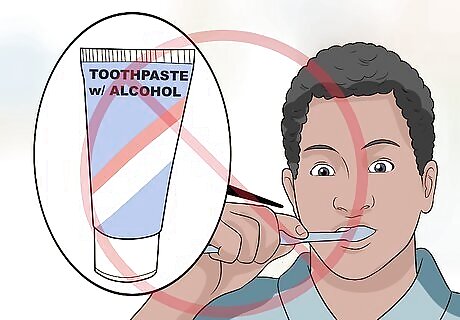
Avoid mouthwashes and toothpastes that contain alcohol. Mouthwashes and toothpastes that contain alcohol can decrease the durability of enamel or even stain it. Use non-alcohol colored toothpaste or mouthwashes to avoid these problems. You can find toothpastes and mouthwashes without alcohol at most grocery and drug stores or online retailers.
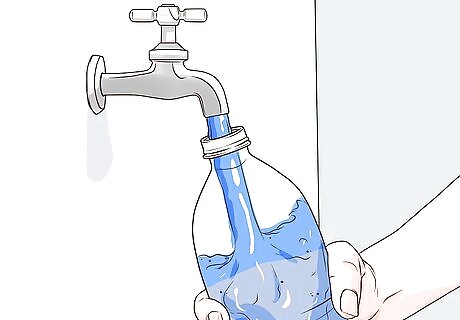
Drink tap water over bottled water. Most tap water in the United States is treated with fluoride to help decrease tooth decay and strengthen enamel. Unless bottled water specifically states that it contains fluoride, the processes of distilling, filtering, and reverse osmosis remove any naturally occurring fluoride from the water. In fact increased consumption of bottled water may be connected to a resurgence of cavities in children. Grabbing bottled water instead of drinking from the tap may contribute to any loss of tooth enamel you may experience. In addition, many bottled waters are actually acidic, which can be harmful to your teeth as well. You can contact the manufacturer of your preferred bottled water to find out if their product contains fluoride.

Don't grind your teeth. If you have a bad habit of clenching and grinding your teeth, you may damage your enamel and teeth. If you're a tooth-grinder, ask your dentist about using a mouth guard. Grinding wears restorations and can cause sensitivity and damage including small chips and cracks. Nail biting, opening bottles or holding objects with your teeth are also bad habits. Try and avoid these habits so that you don't damage your teeth or fillings.
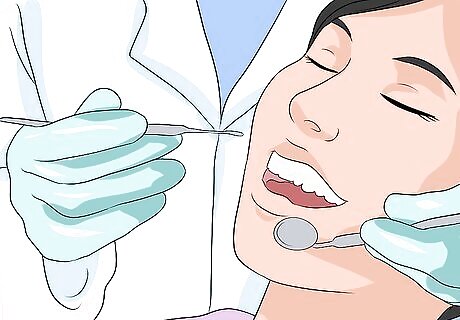
Get regular checkups and teeth cleaning at your dentist's office. Regular checkups and cleanings are an integral part of maintaining oral health. See your dentist at least twice a year, or more often if you're having any issues with your teeth or enamel decay.
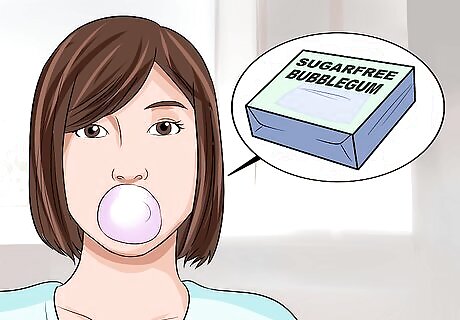
Chew sugar-free gum. Chewing gum increases saliva production, which can help prevent tooth decay. Xylitol has been shown to reduce bacterial activity and tooth decay, so consider a gum with Xylitol in it.


















Comments
0 comment